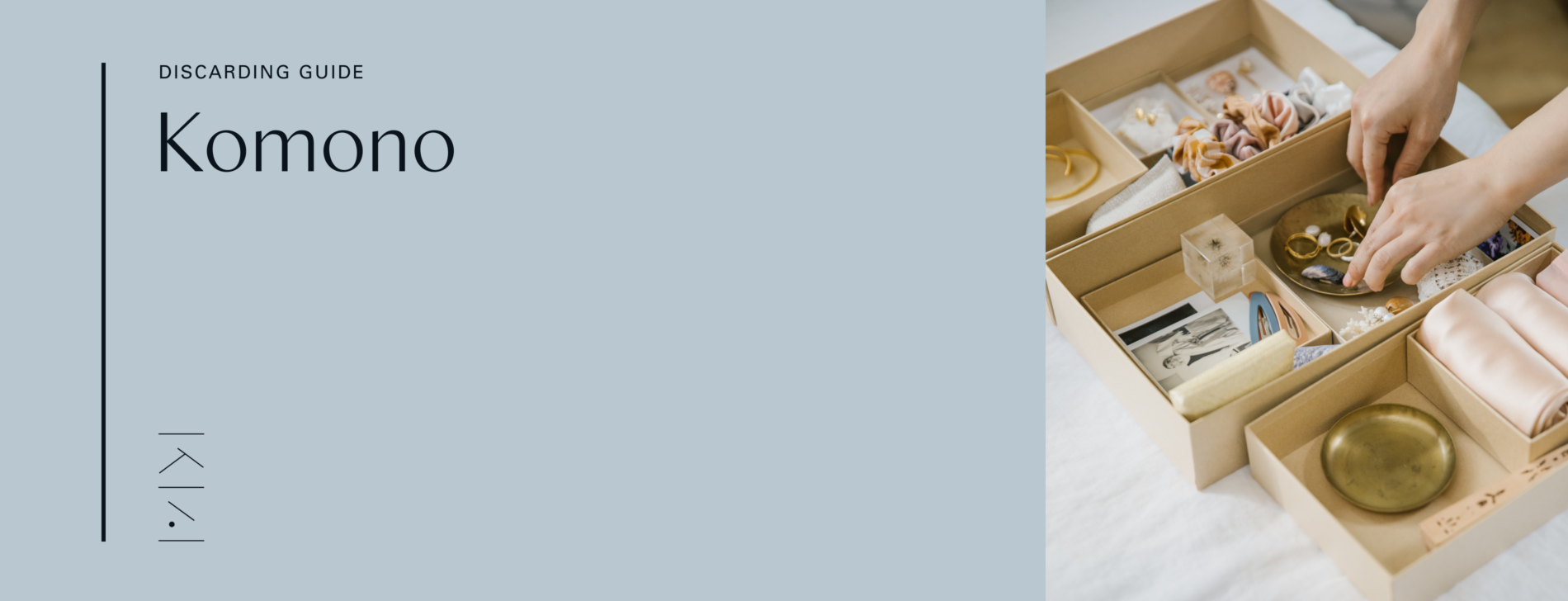If you’ve conquered the overflowing junk drawers, dusty utility closets, cluttered under-the-sink spaces and all other collections of household hodge podge, then it’s finally time to say goodbye to the komono items that no longer serve you (and frankly, you deserve a medal for getting through it).
Komono is particularly tough to tidy and to discard because of the wide variety of subcategories it represents. But, mindful discarding still matters when it comes to komono – miscellaneous items can be harmful to the environment if not disposed of properly. Once you’ve narrowed down what you want to keep, take the guesswork out of discarding what you want to let go of with these by-the-subcategory tips.
Rehoming
Before you donate, resell or discard your komono items, reach out to your network and find out if anyone does need what you no longer do. Making a post on a social platform – especially in community-centric buy nothing groups – is an easy way to find a new home for these miscellaneous things.
Reselling
Listing pre-loved items for resale allows them to spark joy for someone new. These resale platforms ease the process of finding homes for komono items that no longer spark joy for you but may for someone else. Explore and find one that matches your needs on our discarding resources page.
Donating
If you’re unable to rehome or resell these items yourself, try finding a charitable organization where you can donate them to help them find their next home. Call your local thrift stores ahead of time to make sure they are currently accepting the items you are trying to donate. Choose a cause on our discarding resources page and remember – if you wouldn’t feel comfortable giving it to a friend, family member or neighbor, it may be time to repurpose, recycle or discard the item instead.
Recycling
It’s completely normal to find komono items that are no longer appropriate for rehoming, resale or donation. If you must discard these items, make sure to research whether it is safe to throw them in your trash. Empty all recyclable containers and packaging first and toss both in your recycle bin. Then, follow guidelines for safe disposal – especially for household hazardous waste. Find an organization that suits your needs for recycling komono items here.
Once You’re Done
After you discard all the komono items in your home that no longer spark joy, be sure to shift your mindset on consumption and make choices with sustainability in mind. Pick beauty and bath products from brands that allow you to buy in bulk or have container recycling programs in place. Find products with sustainable materials, packaging and production processes and where possible, ditch plastic products for reusables! And of course, limit your komono to only items that spark joy or are truly needed – listen to your head, heart and newly honed sensibility to joy to decide.
Discarding Dictionary
- Cars – You can get a free tow by donating your old car or other motorized vehicle to a charitable organization. You might even be able to claim it as a tax deduction!
- CDs/DVDs – For CDs and DVDs that no longer spark joy, try researching local libraries, schools, hospitals and other organizations that are accepting donations. If a disc that still sparks joy is scratched, you may be able to fix it yourself! For discs that aren’t salvageable, repurpose them for arts and crafts or find an in-person or mail-in recycling program.
- Cleaning Supplies – The chemicals in many cleaning supplies can be potentially harmful to the environment if thrown in the trash, dumped down the drain or disposed of improperly. Make sure to research the specific brand and product you are trying to discard for the best possible disposal directions.
- Computers – Create opportunity by donating your old PC to a youth center or career development nonprofit. Computer won’t start? Find a trusted electronics recycler who will disassemble it for parts or dispose of it safely.
- Electronics – When we trash electronics, we risk putting toxic materials in the ground. Many of your electronics can be repurposed instead. You can even earn cash through buyback programs. The same goes for cords and cables – find a recycling or buyback program that will keep these out of the landfill!
- Food items – Old, expired food items should not be donated. If you cannot cook a meal using them, dump their contents into the compost – if you don’t have a heap of your own, you can likely find one locally – before rinsing and recycling the containers. Donate new or unused food items to local shelters or food banks.
- Kitchenware – Donate gently used kitchen appliances or pots, pans and plates to charitable organizations and shelters near you.
- Linens – Animal shelters are often seeking donations of soft blankets, thick towels and other linens to use in the animal cages. Reach out to your local shelters to inquire! The filling from duvets and pillows can also be repurposed for stuffing cushions, toys and other crafting projects too.
- Mattresses – Mattress recycling programs will convert your old snooze pad from waste to recycling. Charitable organizations and local shelters might want them too – call to find out first!
- Medicines – Don’t flush or toss! To dispose of old prescription medicines that are no longer needed, find a local drug take-back program. Many pharmacies also have a safe drug disposal receptacle – call ahead to find out if yours has one!
- Recreational or hobby komono – If a certain hobby, sport or game no longer sparks joy for you but you still have the komono items associated with it, donate them to a local youth center, school or day care center.
- Stationery and office supplies – Donate these items to local schools and youth programs!
- Toiletries – The harsh chemicals in hair and body bath products may pose a threat to natural life if disposed of irresponsibly! Find a household hazardous waste operation near you and call to make sure they will accept what you’re discarding. Even some toiletry brands have specific initiatives focused on product disposal and recycling – find out if your fave brand has one! Got a drawer full of samples or hotel toiletries you’ll probably never use? Donate them to a local shelter.

